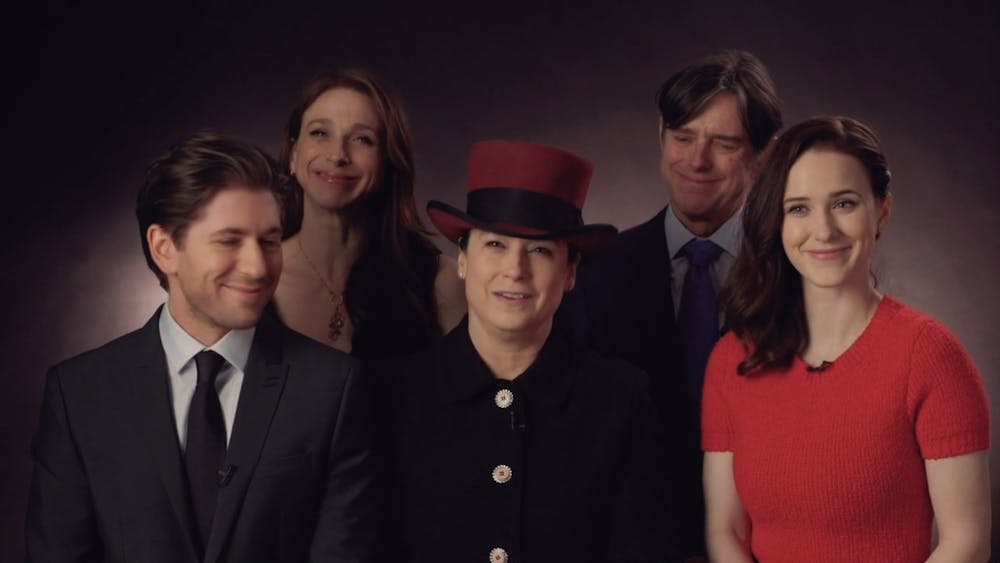The first half of the recently-released third season of “The Marvelous Mrs. Maisel” suffers from stagnant character development and an overreliance on showy setpieces in place of plot progression. Filled with the quickfire dialogue and active tracking shots now characteristic of creator Amy Sherman-Palladino, season three starts off by moving quickly to nowhere. Even with the show’s title character Midge (Rachel Brosnahan) leaving New York to tour with Shy Baldwin (Leroy McClain) — a fictional character reminiscent of trailblazing pop icons like Chuck Berry and Harry Belafonte — there is a lack of stakes that the lavish shots of mob-run Las Vegas cannot make up for. The circling of previously explored dynamics comes to a head as the fourth episode “Hands!” ends with a reunion that Midge and the show have been trying to move on from since the pilot.
Midge’s high-strung parents Abe (Tony Shalhoub) and Rose Weissman (Marin Hinkle) find themselves in a rut after the fallout of Abe’s spontaneous decision to quit his job as a tenured professor at Columbia University. Upon asking for a raise in her yearly allowance, Rose, a character who fought to have her voice and desires heard in season two, walks away from her inheritance after being ridiculed by her glaringly misogynistic male relatives.
As they are no longer able to afford their beloved Upper West Side apartment, Abe and Rose struggle to find their individual purposes and a new home. Relegated to staying with their former son-in-law’s parents, Moishe (Kevin Pollak) and Shirley Maisel (Caroline Aaron), in their newly purchased home in Queens, the two languish in an existential dispiritedness that mirrors the the show’s inability to speak to any fresh themes or conversations.
It is not until the fifth episode, “It’s Comedy or Cabbage,” that the season takes off and begins to move in new directions. The physical relocation of the tour to Miami and a brief, sultry encounter with a recurring character marks a reinvigoration of the show. Lenny Bruce (Luke Kirby) — who was a real-life comedian known for being a provocative figure — has had an incredible, yet platonic chemistry with Midge since they were arrested together in the pilot episode.
A strikingly less polished and more troubled counterpart to Midge, Lenny takes her on an unofficial date that spans till early morning and arguably fills this episode with more sexual tension and frustration than any other romantic dynamic in this show has been allowed to have. Though nothing actually happens between them, this date seems to recharge the show’s ability to capture interest through sheer smart dialogue.
Episode five acts as a tipping point from which the writers begin to pinpoint darker realities that have hung over this hyper-idealized version of 1950s and 1960s America since season one. The frustrating hypocrisy of Midge’s subjugated mother who’s clearly a victim of her own time — her happiness and stability have always been dependent on the whims of the self-focused Abe — begins to more starkly affect Midge’s mentality and relationship with her mother. A discussion of Phyllis Schlafly, a conservative activist who successfully campaigned against the ratification of the Equal Rights Amendment, emphasizes the deep veins of misogyny and heteronormative toxicity that have been an undercurrent in the story and actions of every character in this show.
Meanwhile, Midge’s own privilege, which has really only been used as a punchline to punctuate her glamour in comparison to working-class characters like her manager Susie Myerson (Alex Borstein), is finally, painfully realized to her. Race and what it meant to be a person of color in America in 1960 — even if you were a celebrated public figure — is brought up for the first time in the sixth episode “Kind of Bleau.”
The second half of season three saves “The Marvelous Mrs. Maisel” from tired tropes and gives the audience reasons to invest in the future of these characters. While there is undoubtedly no need to be concerned about this show remaining a stylistic masterpiece, to remain a strong narrative program, season four should expand on the social issues and personal pain touched on in the latter part of this season.







